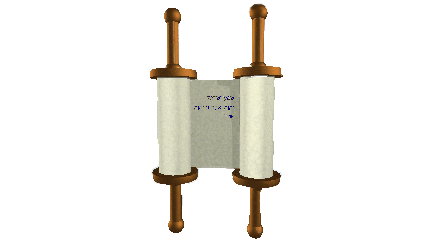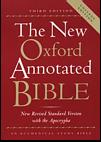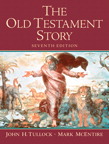
For Dr. Lorin L. Cranford
Professor of Religion
Office: Lindsey Hall 232
Last revised: 08/05/13

|
|
|
|
Learning Topics |
|
|
|
|
| Attendance | Exams | Make-ups |
|
|
Other Items |
Note: These
learning objectives and the explanation provided with each are now officially
university mandated by the Office of Provost: "As
a part of the General Education Competencies, 'Dimensions of Excellence,'
Religion 101 will support the core curriculum by the above objectives."
These are listed in the Topics URL link on your left in the ToC column.
 -----Metzger,
Bruce M., and Roland E. Murphy, eds. The
New Oxford Annotated Bible with the Apocrypha 3rd edition. New
York: Oxford University Press, 2001. (Required)
Click
on GWU Campus
Shop to order books directly from the university.
-----Metzger,
Bruce M., and Roland E. Murphy, eds. The
New Oxford Annotated Bible with the Apocrypha 3rd edition. New
York: Oxford University Press, 2001. (Required)
Click
on GWU Campus
Shop to order books directly from the university. -----Tullock,
John H. The
Old Testament Story. 7. Upper Saddle River,
NJ: Prentice Hall, 2002. (Required)
Click
on GWU Campus
Shop to order books directly from the university.
-----Tullock,
John H. The
Old Testament Story. 7. Upper Saddle River,
NJ: Prentice Hall, 2002. (Required)
Click
on GWU Campus
Shop to order books directly from the university.
This means a maximum of 11 absences for classes meeting three times each week; 7 absences for one meeting twice weekly; and 4 evenings (or 9 class sessions) for one meeting once weekly. For the summer term with two class periods each for five days each week, a total of 11 absences from the 48 total class periods is the limit. Note also: absences due to officially sponsored activities, such as athletic contest will count toward the maximum allowable number of absences but will not be factored into the grade adjustment. Each student is responsible to notify the professor of the reason for each absence to determine whether it is an excused absence; until the online Request for an Excused Absence form is filled out and approved for each class absence, every absence will be considered an unexcused absence, thus substracting 5 points from the Class Participation Grade. The Class Participation grade (up to 10% of semester grade) is predicated on unexcused absences(- 5 pts), excused absences (- 1 pt), tardies (-3 pts), leaving class early (-2 pts), sleeping in class (-3 pts), participation in group assignments (+ 2 pts), answering oral questions in class (+2 pts), etc. Points ranging from 1 to 5 are deducted for every negative activity defined in the preceding sentence!

See the Religion 101 Assignment Sheet for exact dates for both exams and quizzes. These shall be given a majority of the weeks during the semester. No weekly quiz scores will be dropped! No pop tests will be given. According to university policy, the student may elect to take a different, more difficult make-up quiz rather than count the missed quiz as one of the drops, if the student has an excused absence from the class period of the missed quiz.
As a department requirement, a Pre-Test and a Post-Test will be administered at the beginning and at the end of the semester. The Pre-Test does not count toward the semester grade, but the Post-Test will count 5% of the semester grade. See the Semester Grade section below. These tests contain 50 objective questions over the subject field of New Testament, and are not linked to any particular textbook. As a department requirement, the professor merely administers the test for the department and has no control over the content of the tests. The tests are secured and thus are not available for the students to examine. The department is required to develop and administer these tests by the SACS accrediting agency.
Before every
major exam each student, during class roll-call, will
indicate to the professor the chosen exam format option from the three
possibilities listed below:
The Basis
of testing for the weekly quizzes and
the major exams (all three options) will be the topics defined in
the Topics for the Study of the Hebrew Bible.
The sources of information to study in preparation for the tests include
in their order of importance: (1) class discussion notes, (2) the
Study Questions, and (3) the assigned readings
(Sources) on the range of topics covered in
class during the specified test period. The grading of the major exams
will be completed over a two week period after the test date.
Make-up
Exams/ Quizzes:![]()
Make-up testsfor the exams/ quizzes
which are missed will be taken within two weeks of the regular test. One
time for makeups will be scheduled, and a different, more difficult test
will be administered. The format of this exam/quiz will automatically be
the essay exam, option (2) above. Permission to take make-ups shall be
given ONLY to those with justifiable reason for missing the regular exam
(by university policy, only: athletic contests, emergencies, illness or
bereavement). Each student needing a make-up exam must secure permission
from the professor in advance of the scheduled make-up exam by completing
the Request for Make-up
Test form. The form must be approved by the professor before the make-up
can be scheduled; approval will be sent to the student via his/her e-mail
address.
Passage
Analysis:![]()
The student will do the appropriate
research and prepare for submission a formal (i.e., fully documented using
Turabian,
6th ed., as the style guide) research paper consisting of a 'critical
analysis' of an assigned passage from the New Testament. The paper is to
be ten pages double spaced.
The assignment is divided into three
parts with separate due dates:
*Phase 1:Translation
Analysis
etc. in this class must be turned in using a
Microsoft Word document format (filename.doc or
filename.rtf).
Files
created using MS Works, Word Perfect, and Lotus files will not be accepted
unless converted to the rtf format. MS Word is the official GWU
software, and the only one supported by the university IS department.
Acceptable alternatives to MS Office
software:
| Sources: | Reg. Sem. | Sum. Term |
| Exam 1 | 17% | 17% |
| Exam 2 | 17% | 17% |
| Exam 3 | 17% | 17% |
| Exam 4 | ----- | 17% |
| Quiz Avg | 17% | ----- |
| Paper | 17% | 17% |
| Post-Test | 5% | 5% |
| Class Participation | 10% | 10% |
| Semester Avg: | =100% | =100% |
Students are expected to adhere to the university Honor Code that is a condition of enrollment at Gardner-Webb University. See the current Student Handbook under the section 23. Honor Code for the details of this policy. Two items are of particular importance: (1) academic dishonesty and (2) plagiarism.
The GWU Student Handbook defines these actions as follows on pages 50-51. Read them carefully, because they will be enforced to the limit in this class.
Definition of Academic Dishonesty:In addition to the bringing of charges against the student for academic dishonesty and plagiarism as outlined in the paragraphs following the above quote in the Student Handbook, the university authorizes each professor to set additional policies not less strengent, but more strengent than the above stated policy. In this class, the following policy will be strictly enforced:Academic Dishonesty is the deliberate and knowing misrepresentation of one's academic work. A student is dishonest when two circumstances occur: (1) The student could reasonably be expected to know that his/her professor would disapprove of some aspect or circumstance of the student's academic work; and (2) the students submits work to the instructor for evaluation while hiding that particular aspect or circumstance from the instructor. To do so is clearly dishonest because the instructor will evaluate the work as what he/she understands it to be. The student has deceived the instructor by misrepresenting the work, and the evaluation has not been rightly earned. From another perspective, academic dishonesty may be viewed as the use of unauthorized assistance in any work which is to be evaluated--"unauthorized" meaning that the professor would not approve of the form of assistance received and is unaware of its use. The student is being dishonest if he/she deliberately hides this assistance from the instructor while knowing the instructor would not approve of this assistance. If the instructor is unaware of the assistance that has been received he/she will evaluate the work as being entirely the student's own. Thus, the evaluation has not been fairly earned by the student. Furthermore, any student who knowingly gives unauthorized assistance is also guilty of academic dishonesty. On tests and examinations academic dishonesty occurs when a student receives any assistance that the professor has not expressly permitted. It may take the form of looking on another student's test paper or bringing into the test site any information or materials not expressly permitted by the professor. Both of the above definitions of academic dishonesty apply: The student has misrepresented the test as being entirely his/her own work. Furthermore, the student has received unauthorized assistance.
On research papers, reports and other written assignments a form of academic dishonesty is plagiarism, which is the use of someone else's information or exact words without properly "documenting" or identifying that source. Whenever someone else's exact words are used those words must be properly punctuated as a quotation and the source fully identified. Also, any information or ideas which have been taken from a source other than the student's own personal knowledge – book, article, interview, etc. – must be properly documented, even though the student may be rephrasing the information in his/her own words. A student should not hesitate to consult the professor about any question or uncertainty regarding proper documentation of research information. A professor may often allow and even encourage students to work together on assignments or receive assistance from other students, other faculty members, other university staff members, friends, family or others. However, if the professor has not expressly allowed such assistance and expects the assignment to be done entirely by the student, to do otherwise would be dishonest. The student should consult the professor if there is any doubt about outside assistance being allowable....
The examples above are not intended to be a full list of cases of academic dishonesty, but they illustrate the definition. Ultimately, academic dishonesty amounts to deliberately hiding something from the professor. So the best advice is this: Whenever in any doubt, consult the professor."
The minimum penalty for cheating or plagiarism will be a zero for the work submitted. Violations of an egregious or repeated nature may, upon investigation, result in the offender's receiving an F grade for the entire course.Please remember that the purpose of an honor system is not to seek out cheaters, but to ensure the integrity of the hard work that each of you will be contributing to this course. Good, honest students deserve to have their hard work and preparation protected against the rare individual who hopes to slide by on someone else's efforts.
Religion 101 classes will take place in Lindsey Hall (#5 on the map) room 214. The one exception is the first day of classes, when the class will take place in Dover Library (#49 on the map), computer lab. Religion 101 M will meet in Lindsey Hall room 214 on Tuesdays and Thursdays, 1:15 to 2:30 pm.
All students needing accommodations to participate fully in all class activities and to fulfill requirements of the class should notify me of the need as soon as possible. Persons must be certified as having a disability by the Noel Program for Students with Disabilities in order to receive accommodations.Career Opportunities.
The Career Services Office has marvelous services available to GWU students and alumni for job assistance. You need to get your resume posted with them and take advantage of the services Holly Sweat and her assistants provide. Career Servies is proud to announce that the majority of their resources can now be accessed via their website: www.careers.gardner-webb.edu. Upcoming events, career fairs, campus employer recruitment and the Jobs Bulleting are just a few of the resources available on the site. Be sure to take advantage of all Career Services has to offerContact the office at 704 406-4562, their web site at http://www.careers.gardner-webb.edu, or go by their office at Suite 204 in the Dover Campus Center.
Class
Cancelation Notices.
When classes are canceled due to bad weather, you can find this information posted on GWU's web site or call 1- 877-GWU-SNOW. Additionally, area radio -- especially the university's radio station WGWG at 88.3 FM -- and TV stations will be notified of the closing. Very rarely will classes on the Boiling Springs campus be closed for bad weather. Additionally, for this course only, a notice will be posted in the Course Room 101 Bulletin Board just as quickly as the university officially announces the cancelation of classes that will impact this class.
In the event of the need to evacuate the building, the professor will immediately and quickly take roll (if not previously taken). Persons in the classroom will be directed in an orderly fashion to the nearest building exit (indicated by posting in the hallway). Persons will proceed to a gathering point previously designated by the professor (at last 300 feet away from the building). The professor will once again take roll at the designated gathering point. No one should enter the building until instructed by the University Police or other designated personnel on off-campus sites.